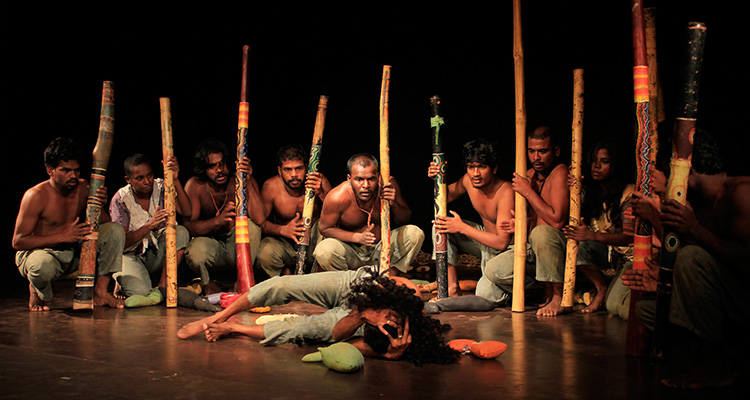META Perspectives: The Director – Kuhaimaravasigal (Cave Tree Dwellers)
S Murugaboopathy, Director of Kuhaimaravasigal (Cave Tree Dwellers), answers a few questions about his experiences of theatre and META.
1. What is your backstage routine before a performance?
A. Apart from proper make-up and warm-up processes, making the actors feeling the collective conscience is an important transformatory process for us. We make the actors feel the presence of other actors and their bodies, particularly breath and significantly pass the inner spirit and energy among themselves. Through intimate presence with others, they experience the presence of others and prepare creating the collective self and body during the performance. The actors also internalize the new (performance) space by experiencing the drama land with their body and mind, through the cultural props.
2. What is the most rewarding experience for you during your performance?
A. During one of our performances of Mirugavidushagam in a tribal village amidst dense forest cover, our performance team was intensely engaged in transforming into cattle as per the script while the audiences were keen on watching the play. Suddenly, a group of cattle came on the sides of the performance space and started watching the performance.
Besides, when we performed Mirugavidushagam at Tiruvannamalai, a dog entered into the performance space while the actors were performing a metaphorical battle between a lion and dogs. The dog stayed through the scene and left later. We just felt the coincidental presence of a dialogue in the play, Yutha nilathil kaivitapatta Kalnadaikal (The cattles abandoned in the landscape of war) and the continuous presence of animals, birds and plants in the script, in almost all plays.
During one of the performances of the play Soorpanangu, a woman from the spectators attempted to make intimate relationship with a tree nearby and began kissing the tree and watching the play alternately.
3. What genre of plays would find you in the audience?
A. As our performance emerges from the collective bodies and voices, it attracts the audience as they might be bored of individual centered plays. While our performance takes the audience to imaginary and internalized world experiencing the inner spirit, they also transform into ones celebrating the collective spirit. Every spectator with deep, inner creative spirit and sensibilities for the future, would be attracted towards our play.
4. Have you had any memorable fan/audience encounters?
A. When we were invited to perform Kuhaimaravasigal at Kala academy Goa, we were actually worried whether our performance (with poetic Tamil script) would attract the audience, who may not understand Tamil at all. But to our surprise, the entire audience stayed till the end of performance; many of them kissed the theatre land (Stage) and congratulated our team expressing their pure love and affection.
Till 2008, all our performances were rehearsed and performed exclusively in specific geographical space such as Theri, a neo-lithic zone in southern Tamilnadu. During these performances at the Theri landscape in Surankudi village in Thoothukudi district, a dog would continuously come for all performances and stay during the entire performance and disappear immediately after the performance.
When we performed Kuhaimaravasigal inside a home for abandoned at Tiruvannamalai, the audience were those affected with paralytic attack and were single parents (mothers/fathers) who lost their sons and daughters. I saw my dead child, was the response of the many people. While others said, We saw the powerful characters present in Bible. All of them invited us and blessed us making cross symbol on our foreheads.
5. How does the story of the play affect or influence you?
A. None of our plays were centered on one story or even a linear narrative. As our performance is deeply engaged in creating a multi-organism or collective organism through collective bodies, our narratives are also multi-layered narratives. For example, Kuhaimaravasigal focuses on internal refugees. But we do not focus on one refugee or story of one refugee. Rather, the refugees come from diversified landscapes with their own complex stories and interweave with other stories and landscapes thus producing a complex multiple narrative.
6. What are the 5 things you are looking forward to about your performance at META?
A. This is second time perform at META festival while we are very eager to perform Kuhaimaravasigal for third time in Delhi. Besides, we strongly believe that theatre is a distinguished language that does not require any translation. While META hosts plays of regions, we also look for a critical encounter with potential theatre audience, who continues to be our spectators in Delhi, and who do not feel the necessity of linguistic translation (Even an ordinary Tamil audience would also feel the same as those of other non-Tamil audience). We also hope to transgress the boundaries of regional/national/trans-national as our plays are not limited to a particular territory but speak the inner spirit of cultural landscapes. Moreover, we also look forward how our theatre language, body work, musical ensembles and cultural props are to be experienced by the spectators in Delhi.
7.Do have any advice for the stage actors struggling getting their message or talent noticed?
A. An actor needs to be aware of oneself, ones own culture and society. An ideal actor should be a cultural actor, who continuously engaged in destroying ones self and prepared to be part of collective cultural self and body.
Watch the META plays from 6th-10th March! Click here to book tickets.




Leave a reply